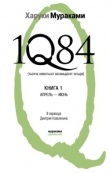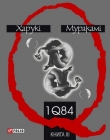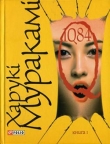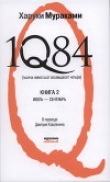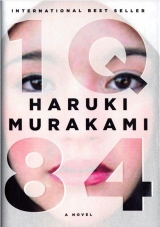
Текст книги "1q84"
Автор книги: Haruki Murakami
Жанр:
Современная проза
сообщить о нарушении
Текущая страница: 50 (всего у книги 81 страниц)
CHAPTER 24
Tengo
AS LONG AS THIS WARMTH REMAINS
Tengo took a morning special express train from Tokyo Station to Tateyama, changed there to a local, and rode it as far as Chikura. The morning was clear and beautiful. There was no wind, and there was hardly a wave to be seen on the ocean. Summer was long gone. He wore a thin cotton jacket over a short-sleeved shirt, which turned out to be exactly right for the weather. Without bathers, the seaside town was surprisingly deserted and quiet. Like a real town of cats, Tengo thought.
He had a simple lunch by the station and took a taxi to the sanatorium, arriving just after one o’clock. The same middle-aged nurse greeted him at the reception desk—the woman who had taken his phone call the night before. Nurse Tamura. She remembered Tengo and was somewhat friendlier than she had been the first time, even managing a little smile, perhaps influenced by Tengo’s nicer outfit.
She guided Tengo first to the lunchroom and poured him a cup of coffee. “Please wait here. The doctor will come to see you,” she said. Ten minutes later, his father’s doctor appeared, drying his hands with a towel. Flecks of white were beginning to appear among the stiff hairs of his head. He was probably around fifty. He was not wearing a white jacket, as if he had just completed some task. Instead he wore a gray sweatshirt, matching gray sweatpants, and an old pair of jogging shoes. He was well built and looked less like a doctor than a college sports coach who had never been able to rise past Division II.
The doctor told Tengo pretty much the same thing he had said on the phone the night before. Judging from his expression and his words, he seemed genuinely saddened when he said, “I’m sorry to say there is almost nothing we can do for him medically at this point. The only thing left to do is let him hear his son’s voice. It might enhance his will to live.”
“Do you think he can hear what people say?” Tengo asked.
The doctor frowned thoughtfully as he sipped his lukewarm green tea. “To tell you the truth, not even I know the answer to that. Your father is in a coma. He shows absolutely no physical response when we speak to him. There have been cases, though, where someone in a deep coma has been able to hear people talking and sometimes even understand what was being said.”
“But you can’t tell by looking at them.”
“No, we can’t.”
“I can stay here until six thirty tonight,” Tengo said. “I’ll sit with him all day and talk to him as much as possible. Let’s see if it does any good.”
“Please let me know if he shows any kind of reaction,” the doctor said. “I’ll be around here somewhere.”
A young nurse showed Tengo to his father’s room. She wore a name badge that read “Adachi.” His father had been moved to a private room in the new wing, the wing for more serious patients. In other words, the gears had advanced one more notch. There was nowhere else to move after this. It was a drab little room, long and narrow, and more than half filled by the bed. Beyond the window stretched the pine woods that acted as a windbreak. The dense grove looked like a wall, separating the sanatorium from the vitality of the real world. The nurse went out, leaving Tengo alone with his father, who lay on his back, sound asleep. Tengo sat on a small wooden stool by the bed and looked at his father.
Near the head of the bed stood an intravenous feeding device, the liquid in its plastic bag being sent into a vein in his father’s arm through a tube. A catheter had been inserted to catch urine, surprisingly little of which had been collected. His father seemed to have shrunk another size or two since the month before. His emaciated cheeks and chin wore perhaps two days’ growth of white beard. His father had always had sunken eyes, but now they were more deeply set than ever. Tengo couldn’t help wondering if it might be necessary to pull the eyeballs up from their holes with some kind of medical device. His eyelids were tightly shut at the bottoms of those caverns like lowered shutters, and his mouth was slightly open. Tengo couldn’t hear his father’s breathing, but, bringing his ear close, he could feel the slight movement of air. Life was being quietly maintained there at a minimal level.
The doctor’s words on the phone last night—“like a train, dropping its speed little by little as it begins to stop”—began to feel terribly real to Tengo. This “father” train was gradually lowering its speed, waiting for its momentum to run down, and preparing to come to a quiet stop in the middle of an empty prairie. At least there was no longer a single passenger aboard, no one to raise a complaint even if the train came to a halt. That was the only salvation.
Tengo felt he ought to start talking to his father, but he did not know what he should say, how he should say it, or what tone of voice to use. All right, say something, he told himself, but no meaningful words came to mind.
“Father,” he ventured in a whisper, but no other words followed.
He got up from the stool, approached the window, and looked at the well-tended lawn and garden and the sky stretching high above the pine woods. A solitary crow sat perched on a large antenna, glaring at the area with disdain as it caught the sunlight. A combination transistor radio/alarm clock had been placed near the head of the bed, but his father required neither of its functions.
“It’s me—Tengo. I just came from Tokyo. Can you hear me?” he said, standing at the window, looking down at his father, who did not respond at all. After vibrating in the air for a moment, the sound of his voice was absorbed without a trace by the void that had come to occupy the room.
This man is trying to die, Tengo thought. He could tell by looking at the deeply sunken eyes. He made up his mind to end his life, and then he closed his eyes and went into a deep sleep. No matter what I say to him, no matter how much I try to rouse him, it will be impossible to overturn his resolution. Medically speaking, he was still alive, but life had already ended for this man. He no longer had the reason or the will to continue to struggle. All that Tengo could do was respect his father’s wishes and let him die in peace. The look on his face was utterly tranquil. He did not seem to be suffering at all. As the doctor had said on the phone, that was the one salvation.
Still, Tengo had to speak to his father, if only because he had promised the doctor that he would do so. The doctor seemed to be caring for his father with genuine warmth. Secondly, there was the question of what he thought of as “courtesy.” Tengo had not had a full-fledged conversation with his father for a very long time, not even small talk. The truth was that Tengo had probably been in middle school the last time they had had a real conversation. Tengo hardly ever went near their home after that, and even when he had some business that required him to go to the house, he did his best to avoid seeing his father.
Now, having made a de facto confession to Tengo that he was not his real father, the man could lay down his burden at last. He looked in some way relieved. That means that each of us was able to lay down his burden—at the last possible moment.
Here was the man who had raised Tengo as his own son, listing him as such in the family register despite the absence of blood ties, and raising him until he was old enough to fend for himself. I owe him that much. I have some obligation to tell him how I have lived my life thus far, as well as some of the thoughts I have had in the course of living that life, Tengo thought. No, it’s not so much an obligation as a courtesy. It doesn’t matter if the things I am saying reach his ears or whether telling him serves any purpose.
Tengo sat on the stool by the bed once again and began to narrate a summary of his life to date, beginning from the time he left the house and started living in the judo dorm when he entered high school. From that time onward, he and his father had lost nearly all points of contact, creating a situation in which neither had the least concern for what the other was doing. Tengo felt he should probably fill in such a large vacuum as best he could.
Ultimately, however, there was almost nothing for Tengo to tell about his life in high school. He had entered a private high school in Chiba Prefecture that had a strong reputation for its judo program. He could easily have gotten into a better school, but the conditions offered him by that school were the best. They waived his tuition and allowed him to live in the dormitory, providing him with three meals a day. Tengo became a star member of the judo team, studied between practice sessions (he could maintain some of the highest grades in his class without having to study too hard), and he earned extra money during vacations by doing assorted manual labor with his teammates. With so much to do, he found himself pressed for time day after day. There was little to say about his three years of high school other than that it was a busy time for him. It had not been especially enjoyable, nor had he made any close friends. He never liked the school, which had a lot of rules. He did what he had to do in order to get along with his teammates, but they weren’t really on the same wavelength. In all honesty, Tengo never once felt totally committed to judo as a sport. He needed to win in order to support himself, so he devoted a lot of energy to practice in order not to betray others’ expectations. It was less a sport to him than a practical means of survival—a job. He spent the three years of high school wanting to graduate so that he could begin living a more serious life as soon as possible.
Even after entering college, however, he continued with judo, living basically the same life as before. Keeping up his judo meant he could live in the dormitory and thus be spared any difficulty in finding a place to sleep or food to eat (minimal though it was). He also received a scholarship, though it was nowhere nearly enough to get by on. His major was mathematics, of course. He studied fairly hard and earned good grades in college, too. His adviser even urged him to continue into graduate school. As he advanced into the third year and then the fourth year of college, however, his passion for mathematics as an academic discipline rapidly cooled. He still liked mathematics as much as ever, but he had no desire to make a profession of research in the field. It was the same as it had been with judo. It was fine as an amateur endeavor, but he had neither the personality nor the drive to stake his whole life on it, which he well knew.
As his interest in mathematics waned and his college graduation drew near, his reasons for continuing judo evaporated and he had no idea what path he should next pursue. His life seemed to lose its center of gravity—not that he had ever really had one, but up to that point, other people had placed certain demands and expectations upon him, and responding to them had kept him busy. Once those demands and expectations disappeared, however, there was nothing left worth talking about. His life had no purpose. He had no close friends. He was drifting and unable to concentrate his energies on anything.
He had a number of girlfriends during his college years, and a lot of sexual experience. He was not handsome in the usual sense. He was not a particularly sociable person, nor was he especially amusing or witty. He was always hard up for money and wasn’t at all stylish. But just as the smell of certain kinds of plants attracts moths, Tengo was able to attract certain kinds of women—and very strongly, at that.
He discovered this fact around the time he turned twenty (which was just about the time he began losing his enthusiasm for mathematics as an academic discipline). Without doing anything about it himself, he always had women who were interested enough to take the initiative in approaching him. They wanted him to hold them in his big arms—or at least they never resisted him when he did so. He couldn’t understand how this worked at first and reacted with a good deal of confusion, but eventually he got the hang of it and learned how to exploit this ability, after which Tengo was rarely without a woman. He never had a positive feeling of love toward any of them, however. He just went with them and had sex with them. They filled each other’s emptiness. Strange as it may seem, he never once felt a strong emotional attraction to any of the women who had a strong emotional attraction to him.
Tengo recounted these developments to his unconscious father, choosing his words slowly and carefully at first, more smoothly as time went by, and finally with some passion. He even spoke as honestly as he could about sexual matters. There’s no point getting embarrassed about such things now, he told himself. His father lay faceup, unmoving, his deep sleep unbroken, his breathing unchanged.
A nurse came before three o’clock, changed the plastic bag of intravenous fluid, replaced the bag of collected urine with an empty one, and took his father’s temperature. She was a strongly built, full-bosomed woman in her late thirties. The name on her tag read “Omura.” Her hair was pulled into a tight bun on the back of her head, with a ballpoint pen thrust into it.
“Has there been any change in his condition?” she asked Tengo while recording numbers on a clipboard with the ballpoint pen.
“None at all. He’s been fast asleep the whole time,” Tengo said.
“Please push that button if anything happens,” she said, pointing toward the call switch hanging over the head of the bed. Then she shoved the ballpoint pen back into her hair.
“I see.”
Shortly after the nurse went out, there was a quick knock on the door and bespectacled Nurse Tamura poked her head in.
“Would you like to have a bite to eat? You could go to the lunchroom.”
“Thanks, but I’m not hungry yet,” Tengo said.
“How is your father doing?”
Tengo nodded. “I’ve been talking to him the whole time. I can’t tell whether he can hear me or not.”
“It’s good to keep talking to them,” she said. She smiled encouragingly. “Don’t worry, I’m sure he can hear you.”
She closed the door softly. Now it was just Tengo and his father in the little room again.
Tengo went on talking.
He graduated from college and started teaching mathematics at a cram school in the city. No longer was he a math prodigy from whom people expected great things, nor was he a promising member of a judo team. He was a mere cram school instructor. But that very fact made Tengo happy. He could catch his breath at last. For the first time in his life, he was free: he could live his own life as he wanted to without having to worry about anyone else.
Eventually, he started writing fiction. He entered a few of his finished stories in competitions, which led him to become acquainted with a quirky editor named Komatsu. This editor gave him the job of rewriting Air Chrysalis, a story by a seventeen-year-old girl named Fuka-Eri (whose real name was Eriko Fukada). Fuka-Eri had created the story, but she had no talent for writing, so Tengo took on that task. He did such a good job that the piece won a debut writer’s prize from a magazine and then was subsequently published as a book that became a huge bestseller. Because the book was so widely discussed, the selection committee for the Akutagawa Prize, the most prestigious literary award, kept their distance from it. So while it did not win that particular prize, the book sold so many copies that Komatsu, in his typically brusque way, said, “Who the hell needs that?”
Tengo had no confidence that his story was reaching his father’s ears, and even if it was, he had no way of telling whether or not his father was understanding it. He felt his words had no impact and he could see no response. Even if his words were getting through, Tengo had no way of knowing if his father was even interested. Maybe the old man just found them annoying. Maybe he was thinking, “Who gives a damn about other people’s life stories? Just let me sleep!” All Tengo could do, though, was continue to say whatever came to his mind. He couldn’t think of anything better to do while crammed into this little room with his father.
His father never made the slightest movement. His eyes were closed tightly at the bottom of those two deep, dark hollows. He might as well have been waiting for winter to come and the hollows to fill up with snow.
“I can’t say that things are going all that well for the moment, but if possible I’d like to make my living by writing—not just rewriting somebody else’s work but writing what I want to write, the way I want to write it. Writing—and especially fiction writing—is well suited to my personality, I think. It’s good to have something you want to do, and now I finally have it. Nothing of mine has ever been published with my name on it, but that ought to happen soon enough. I’m really not a bad writer, if I do say so myself. At least one editor gives me some credit for my talent. I’m not worried on that front.”
And I seem to have the qualities needed to be a Receiver, Tengo thought of adding. So much so that I have been drawn into the fictional world that I myself have written. But this was no place to start talking about such complicated matters. That was a whole different story. He decided to change the subject.
“A more pressing problem for me is that I have never been able to love anyone seriously. I have never felt unconditional love for anyone since the day I was born, never felt that I could give myself completely to that one person. Never once.”
Even as he said this, Tengo found himself wondering if this miserable-looking old man before him had ever experienced loving someone with his whole heart. Perhaps he had seriously loved Tengo’s mother, which may have been why he was willing to raise Tengo as his own child, even though he knew they had no blood tie. If so, that meant he had lived a far more spiritually fulfilling life than Tengo.
“The one possible exception is a girl I remember very well. We were in the same class in the third and fourth grades in Ichikawa. Yes, I’m talking about something that happened a good twenty years ago. I was very strongly drawn to her. I’ve thought about her all this time, and even now I still think about her a lot. But I never really talked to her. She changed schools, and I never saw her again. But something happened recently that made me want to find her. I finally realized that I need her, that I want to see her and talk to her about all kinds of things. But I haven’t been able to track her down. I suppose I should have started looking for her a lot sooner. It might have been much easier then.”
Tengo fell silent, waiting for the things he had talked about so far to sink into his father’s mind—or, rather, to sink into his own mind. Then he started speaking again.
“Yes, I was too much of a coward where these things were concerned. The same reason kept me from investigating my own family register. If I wanted to find out whether my mother really died or not, I could have looked it up easily. All I had to do was go to the city hall and look up the record. In fact, I thought about doing it any number of times. I even walked as far as the city hall. But I couldn’t make myself request the documents. I was afraid to see the truth before my eyes. I was afraid to expose it with my own hands. And so I waited for it to happen by itself, naturally.”
Tengo released a sigh.
“Oh well, all that aside, I should have started looking for the girl a lot sooner. I took a huge detour. I couldn’t get myself going. I just—how should I put this?—I’m a coward when it comes to matters of the heart. That is my fatal flaw.”
Tengo got up from the stool, went to the window, and looked out at the pine woods. The wind had died. He couldn’t hear the roar of the ocean. A large cat was crossing the garden. Judging from its sagging middle, it was probably pregnant. It lay down at the base of a tree, spread its legs, and started licking its belly.
Leaning against the windowsill, Tengo continued to speak to his father.
“But anyhow, lately it has begun to seem as if my life has finally started to change. I feel that way. To tell you the truth, I hated you for a long time. From the time I was little, I used to think that I didn’t belong in such a miserable little place, that I was someone who deserved to be in more comfortable circumstances. I felt it was unfair for you to treat me as you did. My classmates all seemed to be living happy, satisfying lives. Kids whose gifts and talents were far inferior to mine were having much more fun than I was every day. I used to seriously wish that you were not my father. I imagined that this had to be some mistake; you couldn’t possibly be my real father; there couldn’t possibly be any blood relationship.”
Tengo looked out of the window again at the cat. It was still absorbed in licking its swollen belly, unaware that it was being watched. Tengo kept his gaze on the cat as he continued talking.
“I don’t feel that way anymore. Now I think that I was in the right circumstances for me and had the right father. I really mean it. To tell you the truth, I was a useless human being, a person of no value. In a sense, I’m the one who ruined me: I did it myself. I can see that now. I was a math prodigy when I was little, that’s for sure. Even I know I had a real talent. Everybody kept their eye on me and made a big deal over me. But ultimately, it was a talent that had no hope of developing into anything meaningful. It was just there. I was always a big boy and good at judo, and I always did well in the prefectural tournaments. But when I went out into the wider world, there were lots of guys who were stronger than I was. I was never chosen to represent my university in the national tournaments. This was a great shock to me, and for a while I no longer knew who I was. But that was only natural, because in fact I was nobody.”
Tengo opened the bottle of mineral water he had brought with him and took a drink. Then he sat down on the stool again.
“I told you this before, but I’m grateful to you. I believe I’m not your real son. I’m almost sure of it. I’m grateful to you for having raised me even though we had no blood tie. I’m sure it wasn’t easy for a man to raise a small child alone. Now, though, when I recall how you took me around on your NHK collections, I feel sick at heart. I have only terrible memories of that. But I’m sure that you could think of no other way to communicate with me. How should I put it? It was probably the best you could do. That was your only point of contact with society, and you wanted to show me what it was like out there. I can see that now. Of course, you also calculated that having a child with you would make it easier for you to collect the money. But that wasn’t all you had in mind, I suspect.”
Tengo paused briefly to let his words sink in and to organize his own thoughts.
“Of course, as a child, I couldn’t see it that way. It was just embarrassing and painful to me—that I had to go around with you making collections while my classmates spent their Sundays having fun. I can’t tell you how much I hated it when Sundays came around. But now, at least to some extent, I can understand what you did. I’m not saying that it was right. It left me with scars. It was hard for a child. But what’s done is done. Don’t let it bother you. One good thing it did was to make me tougher. I learned firsthand that it’s not easy making your way through this world.”
Tengo opened his hands and looked at his palms for a while.
“I’m going to go on living one way or another. I think I can do a better job of it from now on, without such pointless detours. I don’t know what you want to do. Maybe you just want to go on sleeping quietly, without ever waking up again. That’s what you should do if you want to. I can’t stand in your way if that’s what you are hoping for. All I can do is let you go on sleeping. In any case, I wanted to say all this to you—to tell you what I have done so far in life and what I am thinking. Maybe you would have preferred not to hear any of this, and if that’s the case, I’m sorry to have inflicted it on you. Anyhow, I have nothing more to tell you. I’ve pretty much said everything I thought I ought to say. I won’t bother you anymore. Now you can sleep as much as you like.”
After five o’clock, Nurse Omura, the one with the ballpoint pen in her hair, came to the room and checked the amount of intravenous fluid in the bag. This time she did not check his father’s temperature.
“Anything to report?” she asked.
“Not really. He’s just been sleeping the whole time,” Tengo answered.
The nurse nodded. “The doctor will be here soon. How late can you stay here today, Mr. Kawana?”
Tengo glanced at his watch. “I’ll be catching the train just before seven, so I can stay as late as six thirty.”
The nurse wrote something on his father’s chart and put the pen back into her hair.
“I’ve been talking to him all afternoon, but he doesn’t seem to hear me,” Tengo said.
The nurse said, “If I learned anything in nursing school, it’s that bright words make the eardrums vibrate brightly. They have their own bright sound. So even if the patient doesn’t understand what you’re saying, his eardrums will physically vibrate on that bright wavelength. We’re taught to always talk to the patient in a big, bright voice whether he can hear you or not. It definitely helps, whatever the logic involved. I can say that from experience.”
Tengo thought about this remark. “Thank you,” he said. Nurse Omura nodded lightly and, with a few quick steps, left the room.
After that, Tengo and his father maintained a long silence. Tengo had nothing more to say, but the silence was not an uncomfortable one for him. The afternoon light was gradually fading, and hints of evening hung in the air. The sun’s last rays moved silently and stealthily through the room.
Tengo suddenly wondered if he had said anything to his father about the two moons. He had the feeling that he had probably not done so. Tengo was now living in a world with two moons. “It’s a very strange sight, no matter how many times I see it,” he wanted to say, but he also felt that there wouldn’t be much point to mentioning it. The number of moons in the sky was of no concern to his father. This was a problem that Tengo would have to handle on his own.
Ultimately, though, whether this world (or that world) had only one moon or two moons or three moons, there was only one Tengo. What difference did it make? Whatever world he was in, Tengo was just Tengo, the same person with his own unique problems and his own unique characteristics. The real question was not in the moons but in Tengo himself.
Half an hour later, Nurse Omura came into the room again. For some reason, she no longer had a pen in her hair. Where could it have gone? Tengo found himself strangely concerned about the pen. Two male staff members came with her, wheeling a movable bed. Both men were stockily built and dark-complexioned, and neither of them said a word. They might have been foreigners.
“We have to take your father for some tests, Mr. Kawana,” the nurse said. “Would you like to wait here?”
Tengo looked at the clock. “Is something wrong with him?”
The nurse shook her head. “No, not at all. We just don’t have the testing equipment in this room, so we’re taking him to where it is. It’s nothing special. The doctor will probably talk to you afterward.”
“I see. I’ll wait here.”
“You could go to the lunchroom for some hot tea. You should get some rest.”
“Thank you,” Tengo said.
The two men gently lifted his father’s thin body, with the intravenous tubes still attached, and transferred him to the wheeled bed, moving the bed and intravenous stand into the corridor with quick, practiced movements. Still they did not say a word.
“This won’t take too long,” the nurse said.
But his father did not return to the room for a long time. The light coming in the window grew slowly weaker, but Tengo did not turn on the lamp. If he did so, he felt, something important here would be lost.
An indentation remained in the bed where his father had been lying. His father now probably weighed next to nothing, but still he had left a clear impression of his shape. Looking at the indentation, Tengo had a strong feeling that he had been left behind in this world all alone. He even felt that the dawn might never come again, once the sun had set tonight.
Sitting on the stool by the bed, steeped in the colors of the approaching evening, Tengo stayed in the same position, lost in thought. Then suddenly it occurred to him that he had not actually been thinking at all but had been aimlessly submerging himself in a vacuum. He stood up slowly, went to the toilet, and relieved himself. After washing his face with cold water, he dried his face with his handkerchief and looked at himself in the mirror. Then, recalling what the nurse had said, he went downstairs to the lunchroom and drank some hot green tea.
His father had still not been brought back to the room when Tengo returned there after twenty minutes downstairs. Instead, what he found, in the hollow that his father had left in the bed, was a white object that he had never seen before.
Nearly five feet in length, it had smooth, beautiful curves. At first sight, it seemed to be shaped like a peanut shell, its entire surface covered with something like short, soft down that emitted a faint but even glow. In the rapidly darkening room, the pale bluish light enveloped the object softly. The thing lay still in the bed, as if to fill the individual space that his father had temporarily left behind. Tengo halted in the doorway, hand on the knob, staring at the mysterious object. His lips seemed to move somewhat, but no words emerged from them.
What is this thing? Tengo asked himself as he stood there, frozen to the spot, eyes narrowed. How had this come to be here in his father’s place? No doctor or nurse had brought it in, that much was obvious. Around it hovered some special kind of air that was out of sync with reality.


